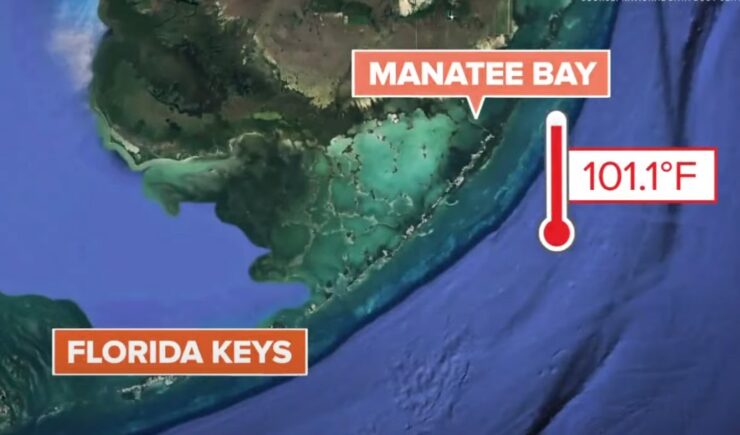MIAMI, FL – An extraordinary record may have been set this week, with the ocean’s temperature in South Florida edging past previously reported maximums. In the sultry bays between the mainland and the sun-soaked Florida Keys, meteorologists noted a blistering 101.1 degrees Fahrenheit.
A water temperature recording in Manatee Bay, situated to the south of Miami, is speculated to be a new world record. This remarkable figure, if verified, could unseat the current unofficial record of 99.7 degrees Fahrenheit set in the distant waters of Kuwait.
These surging temperatures have resulted from weeks of escalating heat in South Florida and the broader western United States. The relentless heat wave has seen Miami suffer 43 consecutive days with a heat index above 100 degrees, smashing the previous record by 11 days, according to Brian McNoldy from the University of Miami.
The process of validating such record-setting temperatures can be complicated. Jeff Masters, a meteorologist with Yale Climate Connections, pointed out that official sea surface temperature records are not maintained, and verification can be challenging, especially given the land proximity of the Manatee Bay gauge.
However, unusually high temperatures were not confined to Manatee Bay. Across 11 stations in the vicinity, sea surface temperatures soared past 96 degrees, a potent testament to the widespread heat.
As our oceans continue to heat, more than 40% are now experiencing marine heatwaves, a number that could reach half of the world’s oceans by September.
The origins of this extreme heat cannot be simply attributed to normal seasonal variations or the developing El Niño in the Pacific. Climate scientists caution that such a perspective ignores the larger, more worrying trend: long-term climate change.
Notably, a high-pressure system has lingered over South Florida, contributing to rising water and air temperatures. Additionally, a blocked pattern in the jet stream, linked to climate change, has been blamed for the recent heatwaves across North America.
International scientists studying the influence of climate change on extreme weather events warn that heatwaves, like the one endured in the western U.S. and northern Mexico this summer, are becoming increasingly frequent due to human activity. Far from being outliers, these heatwaves are becoming the new norm and are expected to become even more commonplace if our reliance on fossil fuels continues.
“Heat is among the deadliest types of disaster,” warned Julie Arrighi of the Red Cross Red Crescent Climate Centre, emphasizing the need for an urgent shift in our understanding and response to extreme heat events. The heatwaves scorching our planet are indeed a stark, tangible demonstration of our rapidly changing climate.
Source:
https://www.yahoo.com/news/101-1-degrees-water-temperatures-214600885.html














